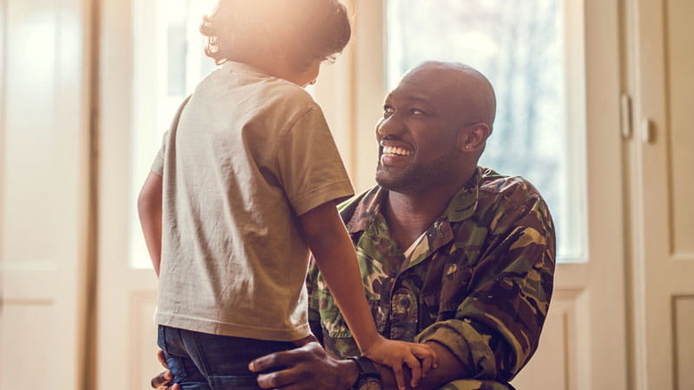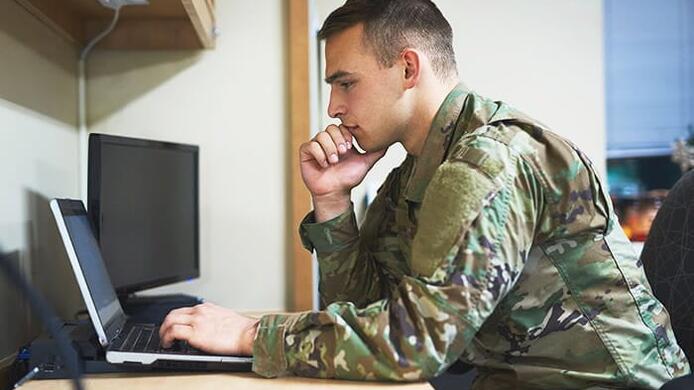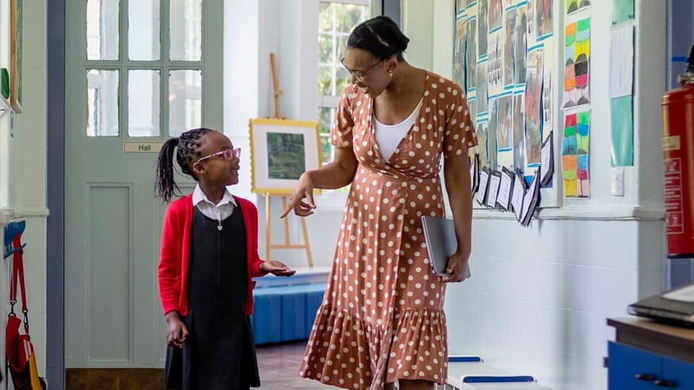Explore our resources for social work degrees and learn about career options that fit your future.

After serving our country, many military service members find themselves in need of assistance. They may need help managing the transition back to civilian life, maintaining housing, navigating family issues, or accessing necessary healthcare.
In fact, U.S. service members and veterans face an increased risk of mental health issues upon returning from combat experiences. Fortunately, there are specialists out there who are trained to help. Dr. Ellen Belluomini, assistant professor of social work at University of Massachusetts Global, says all social workers should be well-versed in working with the military, as military social work skills are needed at every agency.
Approximately 6 percent of the U.S. population consists of military veterans. When you factor in current service members and the families of service members and veterans alike, it’s clear that a good portion of the U.S. population is directly impacted by military service. “What we’re trying to do is help people understand that military social work is a different intersection that we all need to be aware of,” Dr. Belluomini offers. “Military social work isn’t just for military installations anymore. Military social work is for everyone.”
What Is Military Social Work?
Military social work is a specialized field within social work that focuses on providing support and services to military service members, veterans, and their families. Professionals in this field address a wide range of issues unique to the military community, including deployment-related stress, combat trauma, reintegration into civilian life, family dynamics, and access to healthcare and benefits.
Military social workers work within various settings —including military installations, Veterans Affairs (VA) facilities, community organizations, and private practices — to deliver counseling, advocacy, case management, and other interventions tailored to the needs of individuals and families connected to the military. They play a crucial role in promoting resilience, facilitating successful transitions, and enhancing the overall well-being of those who have served or are currently serving in the armed forces.
What Types of Work Do Military Social Workers Perform?
While the Department of Defense and the Department of Veterans Affairs have made access to high-quality mental health care more of a priority for service members, veterans, and their families, many veterans seek services in the civilian sector. Yet, a RAND Corporation report found just 13 percent of surveyed civilian providers met the threshold of cultural competency when it comes to serving military populations.
Social workers must have a level of familiarity with military and veteran culture to provide the appropriate care. There are some specific areas that these workers will focus their efforts and thus should focus on building their knowledge:
Benefits and Financial Aid
Many of the problems veterans and active service members face are related to benefits and finances. These professionals help service members navigate the VA and Social Security benefits programs in order to get the benefits they deserve. Social workers can help with applications, appeals, and access to these services.
Oftentimes, current and former individuals in the military understand the value of an education as they look to transition into civilian life. Understanding the GI Bill and staying up to date with any changes can provide the financial support needed to reach the goal of obtaining a college degree.
Mental Health Care
Veterans often face serious mental health issues due to the trauma of active duty. Social work in the military includes helping veterans work through these challenges. While social workers are not mental health professionals, they can be trained to provide counseling and to connect their clients to supportive resources in the mental health world.
It’s also important for military social workers to familiarize themselves with substance abuse. According to the Substance Abuse and Mental Health Services Administration (SAMHSA), in 2020 over 12% of veterans struggled with a substance use disorder (SUD). While you are providing counseling services, look for signs of an SUD to connect your client with the right support and treatment.
Advocacy Services
Sometimes, veterans need someone to help them as they adjust to civilian life. They may struggle to know where to put their skills to work in the workforce, or they may need advocacy help when dealing with the aftermath of active duty and the resulting physical or mental challenges. Many professionals who work as veteran social workers will perform the role of advocate through case management, education, and more, helping their clients navigate these challenges.
Types of Military Social Work Jobs
Most social workers will work with our military population in some capacity, but if you'd like to dedicate your career to working with service members there are a few specific options to consider.
Civilian Military Social Work
Social workers trained in military competencies may work with service members, veterans, and their families in various organizations within the civilian community. Their military social work skills can be used in the areas of substance abuse, mental health, child welfare, homelessness, or within employee assistance programs.
If you’re curious about a position in civilian military social work, there are several places to look. The various branches of the U.S. military have specific resources in place to offer support to their personnel in civilian environments, typically when they return from deployment. Trained military social workers are needed in community-based clinics, veterans’ centers, schools, civilian healthcare organizations, corporations, and private practices.
Social workers in this sphere may also consider the following branches of civilian-based support centers designed to serve military members and their families:
- Fleet and Family Support Program Centers provide services to members of the U.S. Navy and their families.
- The Marine Corps Community Services provides services to members of the U.S. Marines and their families.
- Airman and Family Readiness Centers provide services to members of the U.S. Air Force and their families.
- Army Community Service Centers provide services to members of the U.S. National Guard and their families.
Active-Duty Military Social Work
Each branch of the military provides mental and emotional health services to their active-duty personnel. They employ military social workers within medical and mental health departments on their military bases.
Some armed forces social workers are civilians, while others have completed military training and serve as active-duty service members, traveling alongside a specific unit. Regardless of military status, the goal of military social workers in this sphere is to offer clients the support needed so that they can function most effectively in their jobs.
Veteran Social Work
Military social workers also have an opportunity to focus their services on our veteran population. The Department of Veterans Affairs (VA) employs thousands of social workers who are equipped to help military veterans with a host of issues.
Veteran social workers can provide the following services:
- Assisting with financial or housing struggles
- Helping navigate military benefits from the VA, Social Security, and other organizations
- Developing treatment approaches related to mental health struggles
- Counseling related to marriage or family problems
- Providing guidance and resources for substance abuse issues
- Assisting with the process of moving to an inpatient facility
- Acting as an advocate for your needs and preferences among your team of medical providers
Military social workers who work with veterans also provide ample support and services to family members. In addition to operating at VA medical centers, these social workers can be found at community-based clinics, veterans’ centers, and private clinics and practices.
Do You Need Military Clearance to Work as a Military Social Worker?
Some areas of military social work, such as active duty, require you to join a military branch. For instance, the various branches hire in-house social workers to help with mental health and benefits services. To qualify to fill one of these roles, you will need proper military clearance and the necessary military training.
However, there are roles in this field that do not require you to work for a branch of the military. If you want to focus your efforts on working as a veteran social worker and not working directly with active-duty military members, you can find employment in agencies on the civilian side or with the VA. Additionally, some branches have in-house roles available specifically for civilians. These roles do not require full military clearance, but still give you the chance to give back to military service members.
The Role of Social Work Degree Programs
Social work degree programs play a pivotal role in preparing individuals for the unique challenges of military social work. These programs provide comprehensive training in areas such as trauma-informed care, crisis intervention, and family dynamics, equipping students with the skills necessary to support service members, veterans, and their families.
“We go over all the cultural components social workers should become familiar with,” Dr. Belluomini says. Students get a small taste of what the military experience is actually like by participating in a simulated parallel process in the course, relying on combat buddies for support and experiencing squad missions to demonstrate the need for group cohesion. It’s designed to mimic the military experience.
“The first class is boot camp, then they serve active duty and finally transition out into civilian population,” Dr. Belluomini explains, adding that there’s particular emphasis on the final phase. “Transitioning out of the military is one of the most difficult things for a military member to do, because military life is so vastly different from civilian life.”
Both active and former military personnel can encounter psychological and emotional difficulties from their experiences. In addition to experiencing PTSD, depression, or anxiety, service members may deal with isolation, insomnia, or substance abuse. They may also struggle with unemployment, financial hardship, or marital conflicts. Social workers can help military clients address these difficulties with individual or family counseling, while helping clients access available resources and education services. This is why enrolling in a military social work degree program that contains courses covering these topics is critical.
How Can I Start a Career as a Military Social Worker?
If you are interested in pursuing social work in the military, the general course of study and credentialing is as follows:
- Earn a bachelor's degree. Most will start with a Bachelor of Arts in Social Work, which provides the foundational training for this career path. This is a traditional degree program that can take up to four years to complete.
- Complete a graduate-level degree program. A Master of Social Work degree is the next step. Look for a CSWE-accredited program that will prepare you well for all types of social work, including in the military. An MSW is required to become a licensed clinical social worker. Be sure the program you choose includes courses directly correlated with the military population.
- Gain experience. The next step is to pursue field experience. Many social workers will enter a paid internship or pursue volunteer opportunities within a military setting. Organizations like Veterans of Foreign Wars or Disabled American Veterans will help you develop a passion for serving this demographic.
- Get licensed. Once you determine where you wish to work, follow all state or military regulations to get the proper license. This involves passing your state’s licensing exam.
Are You Prepared to Serve as a Military Social Worker?
If you’re looking for a career that can allow you to give back to those who've served our country, military social work could be the perfect way for you to make a difference. Whether you’re starting your educational journey from scratch or you’ve already earned an undergraduate degree, UMass Global can help you achieve your goals of working in military social work. For those who have already earned a bachelor’s degree outside of social work, UMass Global allows you to complete the MSW degree program without having to earn your BSW. Request more information or apply today.








